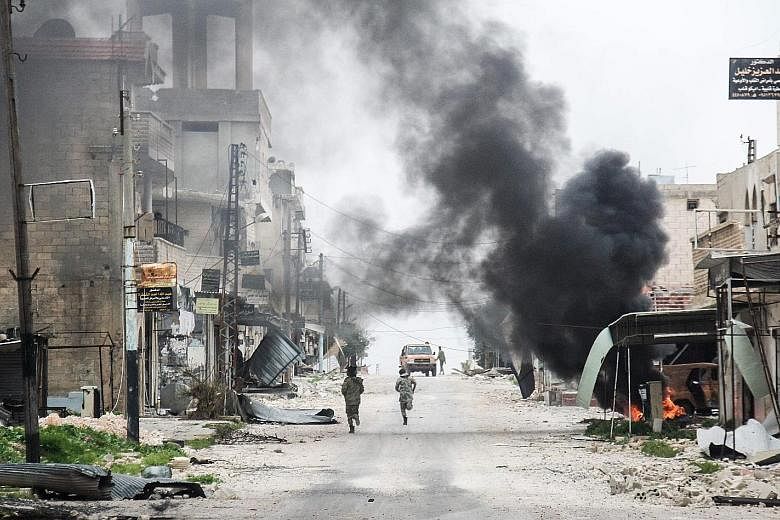WASHINGTON • Secretary of State Rex Tillerson said the United States would set up "interim zones of stability" to help refugees return home in the next phase of the fight against ISIS and Al-Qaeda.
The top US diplomat was speaking at a meeting of 68 countries and organisations fighting the Islamic State in Iraq and Syria (ISIS) before it claimed responsibility for Wednesday's terror attack in London.
"Nearly all of (ISIS leader) Abu Bakr al-Baghdadi's deputies are now dead, including the mastermind behind the attacks in Brussels, Paris and elsewhere. It is only a matter of time before Baghdadi himself meets this same fate," Mr Tillerson told the gathering at the State Department.
It was the first major diplomatic event hosted by the former Exxon oil executive.
Mr Tillerson did not make clear where the "interim zones" were to be set up, however, or how they would work.
"The United States will increase our pressure on ISIS and Al-Qaeda and will work to establish interim zones of stability, through ceasefires, to allow refugees to return home," he said.
Creating such safe havens could ratchet up US military involvement in Syria and mark a major departure from President Barack Obama's more cautious approach.
Asked about Mr Tillerson's remarks, coalition spokesman Colonel Joseph Scrocca said the US military had not yet received direction to establish any kind of "zones".
Increased US or allied air power would be required if President Donald Trump chooses to enforce "no fly" restrictions, and ground forces might also be needed to protect civilians in those areas.
A final statement at the end of the meeting did not mention the possibility of safe zones.
ISIS has been losing ground in both Iraq and Syria, with three separate forces, backed by the United States, Turkey and Russia, advancing on the group's Syrian stronghold city of Raqqa.
US defence officials said on Wednesday that the US-led coalition has airlifted Syrian rebel forces in an operation near the Syrian town of Tabqa in Raqqa province to retake territory from ISIS in a mission that includes artillery and special operations troops.
"I recognise there are many pressing challenges in the Middle East, but defeating ISIS is the United States' No. 1 goal in the region," Mr Tillerson said. "As a coalition, we are not in the business of nation building or reconstruction."
Resources should be focused on preventing the resurgence of ISIS and equipping war-torn communities to rebuild, he said.
Wednesday's event was the first meeting of the coalition since the election of Mr Trump, who has pledged to make the fight against ISIS a priority.
Mr Tillerson called on coalition partners to make good on financial pledges to secure and rebuild areas where ISIS has been pushed out. The coalition has pledged more than US$2 billion (S$2.8 billion) in assistance for Iraq and Syria this year.
Iraqi government forces, backed by the US-led international coalition, retook several Iraqi cities from ISIS last year and have liberated eastern Mosul.
While the extremist group is overwhelmingly outnumbered by Iraqi forces, it has been using suicide car bombs and snipers to defend its remaining strongholds.
Speaking at the same meeting, Iraqi Prime Minister Haider al-Abadi called for unity in the region to combat ISIS, and outlined Iraq's progress in the fight. He said Iraq was now at the stage of "destroying" ISIS, not just "containing" it.
Recounting a Tuesday conversation with the Iraqi leader, Senator Lindsey Graham said Mr Abadi believed that reconstruction of Anbar province as well as Mosul in Nineveh province would cost about US$50 billion.
REUTERS

